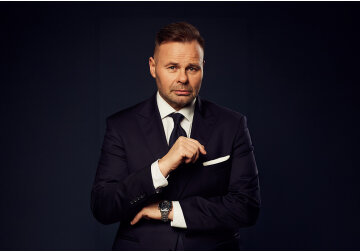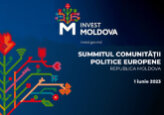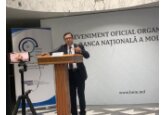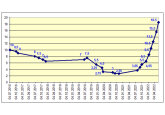
There is potential for new investments in Moldova, especially in the context of European integration - PMI Vice President for Northeast Europe Michal Mierzejewski
In the context of the transformation of the global tobacco and nicotine market and the search for new investment directions, a number of companies consider Eastern Europe as a potential platform for further growth. The region is not simple, it is in the process of European integration and harmonization of legislation, and is also characterized by a complex regulatory environment, an illegal market, and an unstable geopolitical situation. At the same time, European integration processes, the geographical location of the country, highly qualified specialists create the basis for interest from international investors. Philip Morris International is an example of an international business that seeks to diversify its product portfolio, directing investments to new markets with promising economic potential and commitment to European values.
Philip Morris International's Vice President for Northeast Europe, Michal Mierzejewski, during a recent visit to Moldova, noted the importance of the country for the future of investments. "We see potential here, especially in the context of European integration. However, there are also challenges: the illegal market and regulatory uncertainty," he stressed.
The delegation that visited Moldova included representatives of PMI from countries such as Poland, Lithuania, Latvia, Estonia, Ukraine, the Czech Republic and Slovakia, which indicates the growing attention of international business to this region. In 2023, the company announced the expansion of investments in factories in Krakow (Poland), Otopeni (Romania), Kutna Hora (Czech Republic), Lviv (Ukraine), Niš (Serbia) and Chisinau (Moldova).
Mierzejewski also noted that for major international players, having a stable business environment and predictable investment regime, as well as regulatory policies in line with the EU Directive, is a critical factor in decision-making.
He stressed that in terms of economic potential, Moldova has important competitive advantages: geographical proximity to the EU, relatively low production costs and availability of qualified personnel. However, according to him, the instability of market regulation and the scale of the illicit trade can become a serious obstacle to long-term investments.
Eastern Europe (including Moldova) is considered a promising area for investment, but the level of political stability and transparency of the business environment remains important criteria for decision-making. "When we invested in Lithuania after the withdrawal of this country from the USSR, we became the first foreign investors there, and this gave a signal to other international companies to enter this market. Today, Lithuania is a stable economy. Hopefully the same will happen with Moldova," Mierzejewski shared.
"It is important to take into account that in countries such as Lithuania, the Czech Republic, Romania and Poland, companies feel protected by stable laws and predictable regulatory policies. This is not yet the case in Moldova. It is important that the government realizes that investors need confidence in the future," Mierzejewski said.
During the visit, the perspectives for expanding production in Moldova were discussed. This question remains open and various scenarios are being considered. One of the key factors influencing this decision is access to sales markets and convenient logistics. PMI's total investment in cigarette manufacturing in partnership with Tutun-CTC is estimated at $3 million. And at the beginning of this year, the production of the company's flagship brand, Marlboro, began in Chisinau. Technical analysis showed that local production is profitable, Tutun-CTC being able to produce up to 80% of the PMI portfolio and to fully cover the needs of the local market. But there is also potential to increase production for Moldova's neighboring markets.
"If we consider the expansion of production, it is important to take into account infrastructure and logistics. Today, many companies prefer countries that have stable transportation routes and integration with European economic mechanisms. Moldova is taking steps in this direction," Mierzejewski said.
Speaking about the challenges, Philip Morris International's Vice President for Northeast Europe stressed that the fight against the illicit trade is a problem for many countries. In some cases, illegal products account for up to a quarter of the total market, which affects state budgets and undermines the system of tax regulation. Successful examples of combating smuggling demonstrate that reducing the share of illegal trade is possible with a comprehensive approach, including strengthening control, coordination with international partners and modernizing tax administration mechanisms. "In Ukraine, over the past year, the illegal market has decreased from 24% to 16%, and in Poland in recent years it has decreased from 25% to 4%. This shows that the right policy can change the situation," Mierzejewski said.
In Moldova, the research company IPSOS estimates the illegal market of tobacco products at 9.8% (September-October 2024), which is 1.9 percentage points less compared to the same period in 2023, and this is the first decrease since 2022, when the market for smuggled and counterfeit tobacco products grew steadily. Mierzejewski emphasizes that this fact is a clear example when the state establishes stable conditions for operating on the market. The decrease in the level of illegal trade with tobacco products in Moldova is due to the change in tax policy and the consolidation of measures implemented by the authorities to fight the black market.
"PMI is one of the largest taxpayers in almost all markets, and no matter what market we look at, PMI acts in accordance with the law. We are a reliable taxpayer and a responsible company. And in the markets where we have production, including Moldova, this is a direct advantage for the local economy," Mierzejewski added.
A separate challenge is the uncontrolled spread of electronic cigarettes. Although these products are considered a less harmful alternative to traditional smoking – not every single product meets the qualitative criteria. The lack of stringent production and certification standards poses significant risks. "The main problem in the case of e-cigarettes is that most of them are made in China and are supplied without proper quality control. No one checks what chemicals are added to the liquids, and the heating temperature can vary, which affects the level of emissions," Mierzejewski explained. An additional risk factor is the active use of disposable e-cigarettes among young people. "These devices are disguised as harmless gadgets, come in bright colors and exotic flavors, which makes them attractive to minors," he said.
He also stressed that the market situation demonstrates that regulatory approaches have a direct impact on the consumption structure and investment attractiveness of the region. “Moldova is one of the most regulated markets. But the question that the government should ask itself is what results they have achieved for the society. Because excessive regulation sometimes has the opposite effect. This is evidenced by the data - in Moldova, almost every third adult is a smoker”.
The experience of countries that have implemented rational regulatory mechanisms confirms that a balanced approach to taxation and combating illegal trade can contribute to the development of a sustainable market and attract additional investment in innovative segments of the industry; and also to help to reduce the number of smokers.
Against this background, in a number of European capitals, the share of smoke-free devices is growing every year, and is thereby reducing the consumption of traditional cigarettes. For example, the market share of the tobacco heating system in Budapest (Hungary) is 40.7%; Athens (Greece) – 32.9%; Rome (Italy) – 30.1%; Bratislava (Slovakia) – 28.8%.
Another example is Sweden, where the smoking rate is less than 5%, an achievement without precedent in the world and serves as an example for other countries. The secret to Sweden's success lies in a flexible strategy based not only on bans and strict regulations, but also on offering smokers access to less harmful alternatives, such as snus and nicotine pouches.
"Science is the basis for the development of smoke-free products. PMI has invested $14 billion in research and development of smoke-free products since 2008 and continues to improve them. Our efforts are also confirmed by independent state institutions. This year, one of the strictest agencies, the U.S. Food and Drug Administration (FDA), issued the first marketing authorization for nicotine pouches of PMI. This event could dramatically change attitudes towards the alternatives offered to smokers to reduce the harm of their addiction."
Philip Morris International's Vice President for Northeast Europe concluded that the approach of these countries proves that stimulating innovation and a pragmatic approach to regulation of the nicotine market has a positive impact on society, as well as on the economies of countries and the region as a whole, encouraging companies to invest in production, create jobs and contribute to economic growth. //11.04.2025 — InfoMarket.







